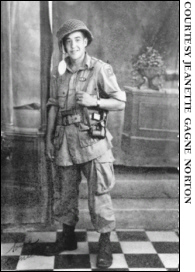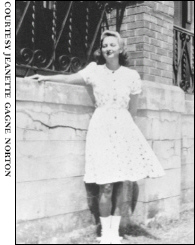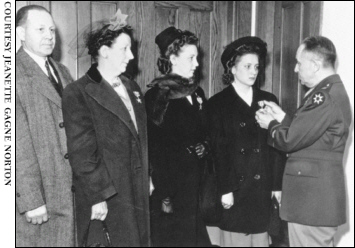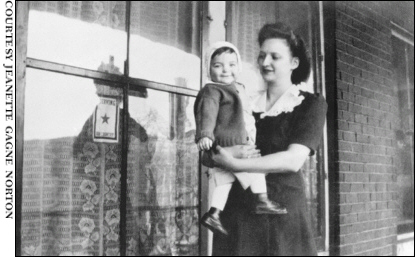Tom Brokaw (29 page)


Camille Gagne

Jeanette Gagne,
wartime portrait
When he arrived at the American cemetery in the village of Margraten, near Maastricht in the Netherlands, he was not prepared for the full impact on his emotions. As he says of his father, “Here was a young guy who basically had his whole life in front of him. He had a young wife in the States and a son he had never seen. He was in a strange country. But he continued to fight with valor for his country. Tears came. . . . Yeah, I did feel a kinship with him people would have a hard time understanding. But I feel closer to him than I would have otherwise.”
Bob brought back a videotape of his father's headstone, the cemetery, and the chapel to share with his mother and his three stepsisters. It was an intensely emotional experience for all of them. The younger people felt an association with the values of their parents' time and generation that might have eluded them before. Jeanette was reminded of her first love, the father of her first child, a man she knew for less than a year before he went off to war. The soldier-husband who gave her permission to attend weekend dances and told her in letters how he longed to be home and hold her and their son.
Now in her seventies, Jeanette remembers when the telegram came and her world came apart. She remembers how she worried that she could not love again. She did love again, of course, and gave birth to sisters for Bob. She enjoys her life in a senior citizens complex, reading Christian novels and crocheting, participating in communal dinners. It's a far more serene time than those years between 1942 and 1945, when she was just a teenager and experiencing enough passion, joy, fear, and grief to be remembered for a lifetime.
D
APHNE CAVIN
has a thick scrapbook from the World War II years. She calls it
Lost Love Remembered.
She discovered it a few years back, and it opened a torrent of memories, many of them difficult. But it also reminded her of a young man and a time in her life when she was certain they would be together forever.
She met Raymond Kelley in August 1941 at a Sunday-school party. “It seemed like there was some chemistry from the beginning,” she says. “I thought he was quite a handsome person.” The romance started quickly and by the following June they were married. Daphne was twenty-one and Raymond was nineteen. By November of 1942 he was off to basic training. They had been in love for a little more than a year.

Jeanette Gagne Norton, receiving her husband's posthumous Silver Star

Jeanette Gagne Norton with baby Robert
Daphne kept busy as a beautician in their hometown of Lebanon, Indiana. Just as Jeanette Gagne was filling her days in Minneapolis with work and movies, Daphne and many other young war wives were doing the same. But there were the constant underlying anxieties. As Daphne says now, she didn't want to tell her customers in the beauty shop about her fears for Raymond, who was fighting in France, because they all had husbands or brothers or boyfriends away for the war effort as well. “You were lonely in a crowd” is the way Daphne explains it.
She wrote to Raymond every day, and the postman made sure she received prompt delivery when a letter arrived from overseas. “He would bring my mail just inside the door at my shop and joke and chat with us.” In one of the letters, Daphne learned that Raymond had been wounded in Italy and was being treated. She didn't know the full extent of the injuries but hoped he'd be shipped home. He wasn't. He was patched up and sent back into action.
In June 1944 Raymond Kelley, twenty-two years old, was killed by a German artillery shell in France. Daphne was helping her sister clean her home when their mother and the family minister suddenly appeared at the front door. Daphne says, “I knew immediately what it was.” Daphne was in a daze. Her world changed instantly. The postman no longer stopped to chat and joke. Now he quietly slipped beneath the door of her beauty shop the returned letters she had written to Raymond.
She recalls, “In our little town, when you walked through, you would see stars in the windows. A blue star meant there was someone in the service. A silver star, you would know he had been sent overseas. A gold star meant you knew he wouldn't be coming back. I had all three stars.”
Daphne decided she wouldn't marry again, and she had to support herself, so she purchased her own beauty shop and named it Daphne Ray Beauty Salon after their two first names. She had a natural flair for business and a good head for numbers, so the beauty salon flourished, but her life was on hold. After about four years her mother encouraged her to become socially active again. Raymond's mother, with whom she kept close ties, seconded the idea. Daphne agreed it was time to move on.
One of her clients had a son, Marvin Cavin, a veteran who had worked in Army hospitals during the war. They courted for a year or so, and then married and settled into a comfortable life on a farm in the middle of Indiana. They raised a familyâtwo girls and twin boysâand over the years Daphne decided not to tell them much about Raymond, for fear it would hurt Marvin's feelings. Her own memories of her first love began to fade.
Once the children were grown she went back to the hairstyling business; she renewed her license and learned the new fashions. Shortly after that, her work became more urgent. Marvin was diagnosed with terminal cancer. Daphne would once again know the heartbreak of losing a husband.
She also had to make a living, so she purchased her own beauty shop again, and when Marvin died, in the mid-seventies, she went back to work full-time. Daphne was surprised when Congress passed a law that made her eligible for Raymond's military pension, even though she had remarried. She laughs now when she says, “I had two men taking care of me.”
Daphne continued her business until 1987, when she decided it was time to retire. Then, unexpectedly, her life took another turn back toward Raymond, her first love. Her sister found the scrapbook she had assembled during the war years. It was thick with memories and poignant reminders of Raymond.
Daphne had saved the wallet Raymond was carrying when he was killed. His driver's license and Social Security card were in it. The scrapbook also preserved their wedding license, a photo of their wedding day, a scratchy recording of a message he sent to her before shipping out, the telegram notifying her of Raymond's death, a letter from President Roosevelt expressing sympathy, and Raymond's combat infantryman's badge.
As the state of Indiana prepared to build a memorial to the Hoosiers who served in World War II, word of Daphne's scrapbook reached
The Indianapolis News
and the paper featured her in a long story called “Lost Love Is Still a Comfort.” Daphne opened the scrapbook for a reporter, smiled, and said, “This is a love story.” Going on, she added that when her sister discovered the scrapbook, “It was hard for me . . . yet it opened up a lot of memories. . . . We put on a lot of false gaiety during the war.”
Raymond was buried in the Allied cemetery at Ãpinal, France, his grave marked with one of those white marble crosses. Daphne has not been there, but when a group of students from a nearby Indiana high school went to Europe as part of their French language training they visited the cemetery and found Raymond's grave. They posed for pictures and brought them home for Daphne.
She's added the pictures to the scrapbook's final pages. There's a powerful symbolism in the snapshot of a young Hoosier's final resting place framed by innocent young teenagers from his home state. His death, and millions more, gave those Indiana teenagers the world they have today. In Daphne's scrapbook there's another equally compelling symbol of their relationship and his sacrifice. When he was killed, he was carrying a poem from Daphne entitled “When You Come Home.” The paper on which it is written is stained with the blood of his mortal wounds.
When You Come Home
When you come home once more to me,
It is unlikely, dear, that I shall be
Articulate; the words I've wanted so
To say, I'll try in vain to speak, I know
I shall reach blindly for you, stricken dumb
With swift and aching joy when you have come,
Or if my tongue find utterance at all,
It will be commonplace and trivial.
But you will understand. And, oh, once more
I'll feel your hand laid lightly on my hand
As was your wont, smoothing it again
And yet again. You'll lift my face and then
We shall forget all else. You'll hold me fast
When you come home, come home to me at last!
Raymond would not be coming home, of course. But Daphne keeps him in her heart. As she says, “He would be seventy-five now. He was twenty-two when he was killed, and that's how I think of him.”
FAMOUS PEOPLE
One of my favorite pictures from the World War II era is of Jimmy Stewart standing with a group of ordinary young Americans, his right hand raised, being sworn into the Army Air Corps. It was everyone's war, from the impoverished North Dakota farm kid to the Ivy League scion, the Hollywood star, the sons of the rich and powerful. Theodore Roosevelt Jr. landed in Normandy on D-Day. FDR's boys were on duty in the South Pacific when their father died, and only Elliott was able to get home for the funeral. Jack Kennedy and his brother Joe were in uniform and in harm's way.
Others we came to know later: George Bush, Richard Nixon, and Gerald Ford, all Navy officers, later presidents of the United States. Ben Bradlee, the most celebrated newspaper editor of his time, was another young naval officer in the Pacific. Art Buchwald, a foster child from the Bronx, joined the Marines at seventeen and emerged to become a universally beloved columnist. Johnny Carson, the master of the television medium, looked like a skinny twelve-year-old in his naval officer's uniform. Julia Child, America's favorite woman in the kitchen, was in the OSS. Byron “Whizzer” White, an All-America football player and Rhodes Scholar, was turned down by the Marines because he was color-blind but was accepted for the Naval Intelligence School. He met John Kennedy in England, and when Kennedy became president, White was his first appointment to the Supreme Court.
Kennedy was just one of scores of World War II veterans to enter the political arena. Their fame grew out of their place in the great public policy debates of their time and the offices they occupied.
The themes of war have long been the stuff of great literature, and once World War II ended, a new generation of American writers emerged. Some are still at work today. Norman Mailer, Kurt Vonnegut, William Styron, William Manchester, James Jones, Paul Fussell, Shelby Foote, and Joseph Heller all served in uniform during World War II.
So did Pierre Salinger, JFK's press secretary and, later, ABC News correspondent. Al Neuharth, founder of
USA Today,
was a combat infantryman. Andy Rooney, of
60 Minutes,
wrote for
Stars
and Stripes
during the war.William Webster has been a distinguished federal judge, the director of the FBI, and director of the Central Intelligence Agency. During the war he had an unremarkable time as a Navy lieutenant; he was not involved in combat, yet he credits the discipline and organizational skills he learned from the Navy with helping him when he took over the formidable job of reorganizing the FBI after the chaos of the Watergate years.
Cyrus Vance embodies the best of his generation as a private citizen and public servant. Vance, a small-town native of West Virginia who earned Ivy League credentials at Yale as an undergraduate and law student, was a junior officer in the Navy during World War II. He left the military in 1946, but in a manner of speaking, he's never left the service of his country. Now in his seventies, he's still at the top of any list when there's a need for a skilled and tireless diplomat in trouble spots such as Bosnia or Africa. For more than half a century he has moved gracefully and effectively between congressional staff jobs, a thriving New York law practice, and as secretary of the Army during the John Kennedy administration, a major player on Lyndon Johnson's diplomatic and national security team, and, for three years, Jimmy Carter's secretary of state.
World War II, like the Civil War but so distinctly different in origin, locale, and time, was the common denominator and the defining experience in the lives of millions of young Americans, whatever their status before the first shots were fired. Later accomplishments, however grand or notorious, cannot diminish the place of their service in the war years.
